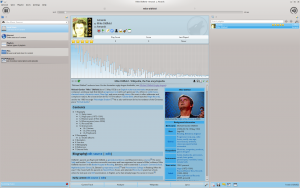Translations:Amarok/15/de: Difference between revisions
Appearance
Neverendingo (talk | contribs) No edit summary |
No edit summary |
||
| Line 1: | Line 1: | ||
{|class="vertical-centered" | {|class="vertical-centered" | ||
|[[Image: | |[[Image:Amarok_2.8_DefaultBlocks.png|thumb|300px]]||'''Amarok''' unterstützt die meisten populären Formate für Musikdateien. <br /><br />Die Liste der tatsächliche unterstützten Formate ist abhängig von den installierten Audio-Codecs und den von ihrem System verwendeten Backends. Es gibt auch Unterstützung für traditionelle Playlists - Sie erstellen, speichern und laden alle Wiedergabelisten, die Sie wollen. | ||
|} | |} | ||

